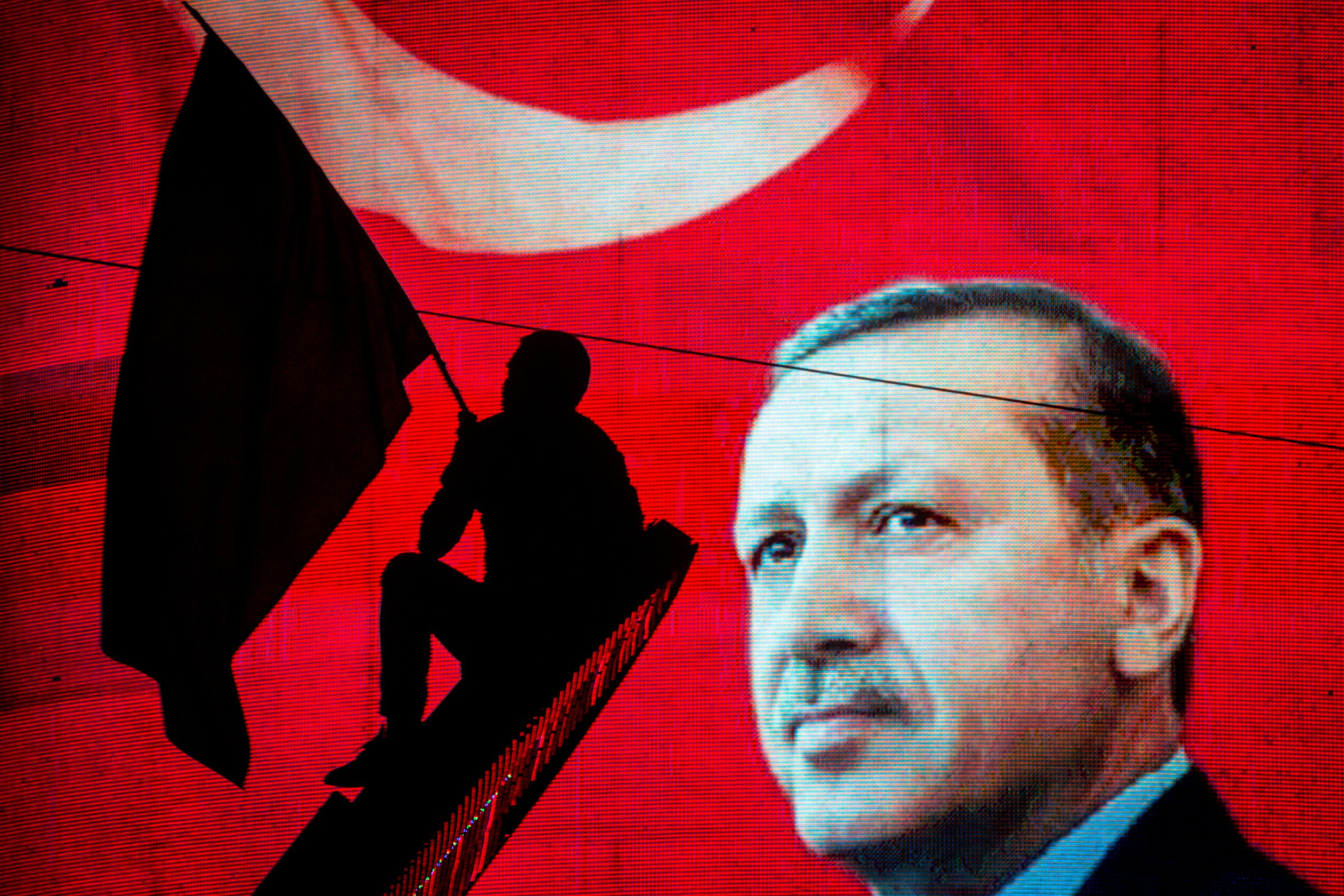
Here in Istanbul’s Cengelkoy neighborhood, people remember the blood in the streets the morning after Turkish military officers attempted to overthrow the government on the night of July 15, 2016.
After soldiers attempted to commander the local police station, residents fought back, rolling cars into the street to stop military vehicles from reaching the nearby Bosphorus Bridge, recently renamed the July 15 Martyrs Bridge. In total, 22 civilians died in the area. Restaurant manager Ismet Morgul, 59, said he was taken prisoner by the mutinous soldiers and forced to lie on the ground for hours. When he and his neighbors were finally freed, the crowd attacked the officers before they were stopped by police. “We were beating them to death,” he recalled on Friday.
The night of the coup was a remarkable moment of unity in Turkey. As soldiers fired on crowds of demonstrators and fighter jets bombed the parliament building, all four major political parties and the vast majority of the public stood against the coup, which left more than 200 people dead. President Recep Tayyip Erdogan’s government is marking the anniversary of the coup attempt this week with great solemnity. But Turkey is once again bitterly divided, returning to the polarization that defined the country’s politics prior to the failed military takeover last July.
Since the coup, Erdogan’s government has prosecuted a sweeping crackdown on perceived opponents. The clampdown began with people suspected of involvement in the coup or with the followers of Fethullah Gulen, the enigmatic U.S.-based religious leader who the government blames for organizing the putsch. But numerous journalists, academics, opposition politicians and activists have also been among the more than 50,000 people arrested in the past year. The official events commemorating the coup focus on the heroism of the ordinary people who resisted the coup attempt, but the tension created by the crackdown casts a pall over the proceedings.
Less than a week ago, hundreds of thousands of people attended a rally against the crackdown in the largest display of opposition in years. Still, members of the ruling Justice and Development Party (AKP) are stressing the themes of unity and resistance in the face of the coup.
“We have to protect our rights and freedoms, but at the same time we have to punish all those who committed this crime against our people,” said former Prime Minister Ahmet Davutoglu in an interview with TIME. Davutoglu visited Cengelkoy on Friday to meet with some of the civilians who fought against the coup, sitting around a table at a restaurant along the Bosphorus Strait.
Asked about the crackdown, Davutoglu added, “If there is any criticism, we can consider those criticisms. In these types of cases, there could be some mistakes that could be also assessed through proper judicial processes. But if the reality is not being seen, that the parliament was attacked, that the people were attacked, then the criticisms will be invalid.”
AKP officials argue that the successful suppression of the coup, which was aided by the loyal branches of the military, was a historic turning point that effectively ended the era of military intervention in Turkish politics. In Turkey, the military has forced a change of government four times since 1960, sometimes with brutal consequences. Following a coup in 1960, elected Prime Minister Adnan Menderes was hanged. It’s a killing that haunts Erdogan. In an oft-repeated story, confidants say the President remembers his father weeping over a news broadcast announcing the hanging.
Erdogan and his supporters seem to want the failure of the coup to mark a transition that transcends politics, a foundational moment for a the country. In a speech on Thursday, Erdogan likened the coup attempt to the battle of Gallipoli, in which the Ottoman empire repelled a massive allied assault in 1915 and 1916. “From now on, nothing will be the same as it was before July 15,” the President was quoted as saying.
Still, Turkey’s deep political discord has continued. Prime Minsister Binali Yildirim said Friday that the government would extend the state of emergency first announced in the aftermath of the coup. The decision permits the government to rule by decree and grants greater power to restrict street protests and media. Bulent Tezcan, the deputy leader of the mainstream opposition Republican People’s Party, responded by saying the government’s use of emergency rule has become “like a drug addiction.”
The plans for the anniversary include the inauguration of a monument near the Martyrs Bridge, where demonstrators faced down soldiers on the night of the coup. Erdogan will speak. In a recreation of the protests a year ago, the anti-coup demonstrations are expected to last all night. Mosques will broadcast a call to prayer, as they did late on the night of the coup. During the weekly noon prayer at mosques throughout the country on Firday, the state-mandated sermon celebrated the heroism of the “martyrs” who died fighting the coup. “A nation was born from the ashes,” the sermon said.
“They are trying to come up with an alternative legitimacy myth, if one could call it that, that is going to underpin the new Turkey, the second Turkish republic,” says Selim Sezak, a Turkish political analyst, referring to the ruling party. “I don’t know if this mythology is going to have as big an audience as they thought it would, but they’re definitely intent on building one,” he says.
More Must-Reads From TIME
- The 100 Most Influential People of 2024
- The Revolution of Yulia Navalnaya
- 6 Compliments That Land Every Time
- What's the Deal With the Bitcoin Halving?
- If You're Dating Right Now , You're Brave: Column
- The AI That Could Heal a Divided Internet
- Fallout Is a Brilliant Model for the Future of Video Game Adaptations
- Want Weekly Recs on What to Watch, Read, and More? Sign Up for Worth Your Time
Contact us at letters@time.com